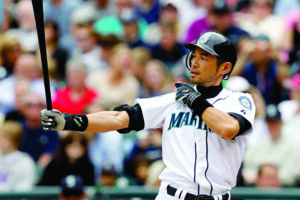By David Mullen
One of baseball’s greatest hitters, Ichiro Suzuki, affectionately known as Ichiro, is already in one Baseball Hall of Fame. On January 21, Ichiro went for two and made it look easy.
After 19 Major League seasons, primarily with the Seattle Mariners, Ichiro was elected to the National Baseball Hall of Fame and Museum in Cooperstown, N.Y., with pitcher CC Sabathia and reliever Billy Wagner, joining 275 other former Major League players previously inducted.

Photo courtesy of Wikipedia
He becomes the first Asian-born player selected for the Hall.
Days earlier, Ichiro received 97.6 percent of the votes from eligible Japanese baseball writers for induction into the Japanese Baseball Hall of Fame and Museum in Tokyo. No one has ever been a unanimous selection for Japan’s HOF. Apparently seven batting titles in nine seasons and 1,278 hits with the Orix BlueWave of Nippon Professional Baseball (NPB) before age 27 didn’t impress 26 members of the Japanese press.
Ichiro will join familiar names like Sadaharu Oh, Hideo Nomo, Hideki Matsui and American “Lefty” O’Doul, honored for fueling baseball’s popularity in the country, in Japan’s HOF. On Sunday, July 27, Ichiro will join familiar names like Babe Ruth, Willie Mays, Hank Aaron, Joe DiMaggio and Ted Williams in America’s HOF.
Ichiro received 97.6 percent of the eligible MLB sportswriter’s votes. He missed being a unanimous selection by one vote. The anonymous writer who didn’t include Ichiro on his ballot should come forward and explain the snub. There can be no rational reason.
Like Sinatra or Elvis, Madonna or Cher, Ichiro’s star power earned him a single name on baseball’s marquee. Long before Shohei Ohtani captivated the international baseball world, adults were enamored by Ichiro’s skill. Kids loved his slight build and full-bodied smile. Fans from around the globe followed his exploits.
When Ichiro played in America, he was a ray of sunshine in the Land of the Rising Sun. Japan was in economic crisis in the 2000s, but their native son was lighting up ballparks throughout the league, and Japanese fans were watching and listening.
“He healed the wounds in Japan’s national psyche,” Kiyoteru Tsutsui, professor of sociology at Stanford, told The Associated Press. “It may not be an exaggeration to say that Ichiro represents Japan’s transition from the faceless economic animal to a producer of global cultural icons.” Ichiro was a cultural icon.
Ichiro could do more than hit. He was fast. He finished his career with 509 stolen bases. He was a superior fielder, had a great arm and was a 10-time Gold Glove winner. He hit the only inside-the-park home run in All-Star Game history. He is the seventh Hall of Fame player with at least 3,000 hits and 500 stolen bases, joining Ty Cobb, Honus Wagner, Eddie Collins, Lou Brock, Paul Molitor and Rickey Henderson.
A language barrier didn’t impact his ability to improve his team. In his first MLB season in 1991 with Seattle, Ichiro’s year was defining. He led the AL with a .350 batting average, 242 hits (a rookie record) and 56 steals. The Mariners won an MLB record 116 games. Ichiro became the second player ever to win the AL Rookie of the Year and AL MVP in the same season. The Boston Red Sox’ Fred Lynn, not in the HOF, did it in 1975.
At 6 foot-6 inches and 300 pounds, Sabathia is the largest player ever elected to the Hall of Fame. Throughout 19 seasons with the Cleveland Indians, Milwaukee Brewers and the Yankees, the fire-balling left hander won 251 games and reached the magical 3,000 strikeout threshold (3,093). Sabathia started 506 games and reached the 200-innings per season mark eight times, won the AL Cy Young Award in 2007 and finished second in the 2001 Rookie of the Year balloting to Ichiro.
Billy Wagner broke his right arm as a child, so he learned how to pitch left-handed. After arriving in the majors as a starter, Wagner was moved to reliever because of a blistering fastball. Wagner saved 422 games in his 16-year career with the Houston Astros, New York Mets, Philadelphia Phillies, Atlanta Braves and Boston and finished with a 2.31 ERA. He remains the Astros’ all-time saves leader. In 903 career innings, he notched 1,196 strikeouts averaging an astounding more than 1.3 Ks per inning.
Ichiro, Sabathia and Wagner join Classic Baseball Era Committee electees Dave Parker and the late Dick Allen, Ford Frick Award winner Cleveland announcer Tom Hamilton and Washington Post baseball writer Tom Boswell in the late July HOF induction ceremony. Counting his hits in the NPB, Ichiro goes into the Hall of Fame as professional baseball’s all-time hits leader with 4,367 (3,089 in MLB and 1,278 in Japan). That is more than Pete Rose’s MLB hit total of 4,256. In 2004, Ichiro captivated North America, the Far East and the world as he chased George Sisler’s single season hits mark of 257. Ichiro finished with 262 hits, still the current single season hits record.
And what kept one MLB sportswriter from voting for Ichiro’s induction into Baseball’s Hall of Fame? One may never know. As big — literally — as Sabathia was and as effective as Wagner was, Ichiro was a world apart.
